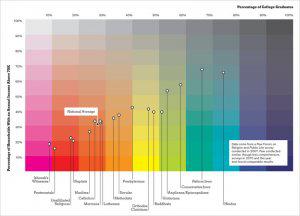 Last week, the New York Times magazine reported on a study by the Pew Forum on Religion and Public Life that looked at the links between economics and religious denominations. The results are in, and – surprise! – Reformed Judaism came out at the top of the heap, with over sixty-seven percent making more than $75,000 a year. And sorry,
Last week, the New York Times magazine reported on a study by the Pew Forum on Religion and Public Life that looked at the links between economics and religious denominations. The results are in, and – surprise! – Reformed Judaism came out at the top of the heap, with over sixty-seven percent making more than $75,000 a year. And sorry,
Pentecostals, but you were dancing around at the bottom of the financial-religious heap, right next to the JW’s and the Baptists.
So it turns out that your religious affiliation has something to do with how much money you make.
Right behind the Orthodox Jews were the Hindus. I always thought those Episocopals were the Protestant high-rollers, and sure enough, they came in third behind the Hindus, and ahead of all the other denominations.
Interestingly, the Protestants as a whole were poorer than the Catholics, which blows that whole idea of the Protestant Work Ethic.
Not that any of this is important.

Or is it? After all, Jesus went around praising the poor and the meek and the humble. They are the ones who will inherit the earth, after all, so You Go, Jehova’s Witnesses and Pentecostals!
But this study was not just about money. It also measured education, which was directly correlated to income. The Reformed Jews and Hindus were the highest educated, followed by the Episcopalians. And a shout out to all the Unitarians, because they were next in line. Even if you don’t think the Uni’s qualify as a real religion.
The author suggests that these income differences stem from subcultures, seeing that some faiths might emphasize formal education more than others.
But it got me wondering: Why wouldn’t a church emphasize education, to encourage their young parishioners to improve themselves, to become more than self-sufficient, and to achieve their full potential? Spiritual growth is important, sure, but shouldn’t churches also be the first in line to inspire folks to become more influential, to be leaders contributing to society?
Image courtesy of Matt Banks.

